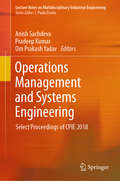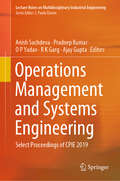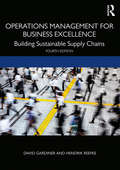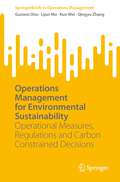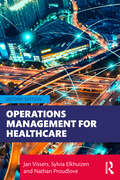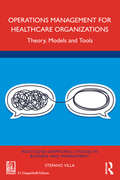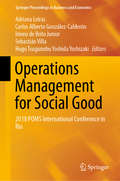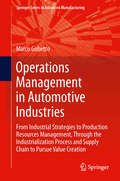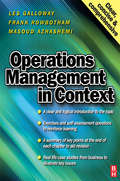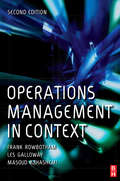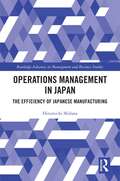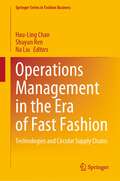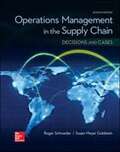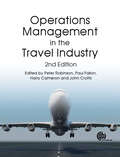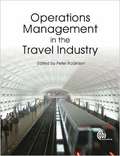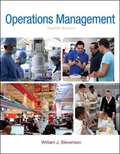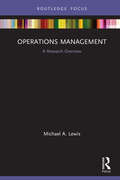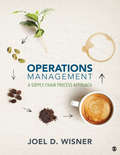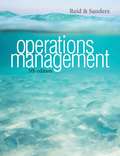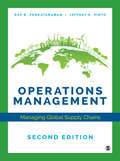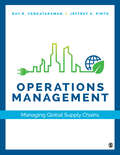- Table View
- List View
Operations Management and Systems Engineering: Select Proceedings of CPIE 2018 (Lecture Notes on Multidisciplinary Industrial Engineering)
by Pradeep Kumar Anish Sachdeva Om Prakash YadavThis book comprises select proceedings of the International Conference on Production and Industrial Engineering (CPIE) 2018. The book focuses on the latest developments in the domain of operations management and systems engineering, and presents analytical models, case studies, and simulation approaches relevant to a wide variety of systems engineering problems. Topics such as decision sciences, human factors and ergonomics, transport and supply chain management, manufacturing design, operations research, waste management, modeling and simulation, reliability and maintenance, and sustainability in operations and manufacturing are discussed in this book. The contents of this book will be useful to academics, researchers and practitioners working in the field of systems engineering and operations management.
Operations Management and Systems Engineering: Select Proceedings of CPIE 2019 (Lecture Notes on Multidisciplinary Industrial Engineering)
by Ajay Gupta Pradeep Kumar Anish Sachdeva O P Yadav R K GargThis book comprises select peer-reviewed contributions from the 6th International Conference on Production and Industrial Engineering (CPIE – 2019). The volume focuses on latest research in the field of Industrial and Systems Engineering, and its allied areas. Articles on variety of topics such as Human Factors Engineering, Lean Manufacturing, Six Sigma, Logistics and Supply Chain Management, Operations Research, Quality Engineering, Measurement and Control, Reliability and Maintenance Engineering, Green Supply Chain Management, Modelling and Simulation, Sustainability, Technology Management, Agile and Flexible Manufacturing, Technology Management and Computer Aided Manufacturing are discussed in this book. Given the range of topics covered, the book will be useful for students, researchers, and professionals interested in different areas of Industrial and Systems Engineering.
Operations Management for Business Excellence: Building Sustainable Supply Chains
by David Gardiner Hendrik ReefkeAll businesses strive for excellence in today’s technology-based environment in which customers want solutions at the touch of a button. This highly regarded textbook provides in-depth coverage of the principles of operations and supply chain management and explains how to design, implement, and maintain processes for sustainable competitive advantage. This text offers a unique combination of theory and practice with a strategic, results-driven approach. Now in its fourth edition, Operations Management for Business Excellence has been updated to reflect major advances and future trends in supply chain management. A new chapter on advanced supply chain concepts covers novel logistics technology, information systems, customer proximity, sustainability, and the use of multiple sales channels. As a platform for discussion, the exploration of future trends includes self-driving vehicles, automation and robotics, and omnichannel retailing. Features include: A host of international case studies and examples to demonstrate how theory translates to practice, including Airbus, Hewlett Packard, Puma, and Toyota. A consistent structure to aid learning and retention: Each chapter begins with a detailed set of learning objectives and finishes with a chapter summary, a set of discussion questions and a list of key terms. Fully comprehensive with an emphasis on the practical, this textbook should be core reading for advanced undergraduate and postgraduate students of operations management and supply chain management. It would also appeal to executives who desire an understanding of how to achieve and maintain ‘excellence’ in business. Online resources include lecture slides, a glossary, test questions, downloadable figures, and a bonus chapter on project management.
Operations Management for Environmental Sustainability: Operational Measures, Regulations and Carbon Constrained Decisions (SpringerBriefs in Operations Management)
by Qingyu Zhang Lijun Ma Guowei Dou Kun WeiThis book explores optimal decisions for companies and governments to build a sustainable supply chain and economy by applying analytical models from new perspectives. Taking differentiated carbon permit-buying and -selling prices into consideration, it investigates the optimal emission permit cap under the “cap-and-trade” regulation and discusses how to establish a two-period carbon tax scheme with a two-period planning horizon. Moreover, it examines how to balance the economic and environmental performances in a closed-loop supply chain, how to implement trade-in program when employing green technologies, and how to strategically use the blockchain technology to improve the environmental performance of supply chain under the carbon tax policy. This book is written for students and researchers who are specialized in the field of operations management with a focus on environmental sustainability. It is also beneficial for specialists and executives at companies that are facing carbon emission regulation challenges, as well as government officials who develop the emission control policies.
Operations Management for Healthcare
by Jan Vissers Sylvia Elkhuizen Nathan ProudloveThis fully updated edition of the bestselling textbook on Health Service Operations Management provides an invaluable reference for students and researchers in the fields of healthcare management, operations management and patient flow logistics. Featuring theoretical frameworks and a comprehensive set of practical case studies, this book also covers subjects such as hospital planning and supply chain management in healthcare, quality assurance and performance management. Healthcare managers work together with healthcare professionals in a multitude of challenging scenarios. Trade-offs have to be made between waiting times for customers and efficient use of scarce resources, between quality of care and quality of services, between the perspective of a single pathway and the total system, and between the perspective of a single provider and that of a network of providers working together in the chain of primary care, hospitals, nursing homes and home care. This book guides healthcare students and professionals through a set of practical tools and resources, ranging from simple queueing models to more complicated analytical models, to help address these issues. The book can be used at an undergraduate level by introducing concepts, definitions and approaches, and at a postgraduate level through the application of approaches to operations management problems in healthcare practice. It will serve as a primary textbook for a health service operations management course module in a Master's program on healthcare management.
Operations Management for Healthcare Organizations: Theory, Models and Tools (Routledge-Giappichelli Studies in Business and Management)
by Stefano VillaVarying factors such as the aging of the population, the increasing burden of chronic conditions and the recent global pandemic have highlighted the need for a redesign of healthcare production processes. This book provides a useful framework to capture the necessary organizational conditions to successfully implement operations strategies within healthcare organizations. The Operations Management (OM) function has become crucial; in fact, it is essential for managing the flow of both patients and supplies, in an efficient, responsive and flexible manner. The book outlines the models and operational solutions to these two key areas that characterize OM in healthcare: patient flow logistics, with the goal of optimizing the entire production cycle from first access by the patient to discharge and follow-up; and supply chain management, with the goal of ensuring that resources are successfully managed throughout the production lifecycle. The examples and case studies included in the book are based on the experience of the author who has had the opportunity to do research and training in the area of operations management, within different types of healthcare delivery organizations at both the national and international level, and often at publicly owned institutions. The book is a useful guide for students, managers and policy makers interested in the development and implementation of the OM function in healthcare delivery organizations.
Operations Management for Social Good: 2018 POMS International Conference in Rio (Springer Proceedings in Business and Economics)
by Sebastián Villa Adriana Leiras Carlos Alberto González-Calderón Irineu de Brito Junior Hugo Tsugunobu Yoshida YoshizakiThis volume showcases the presentations and discussions delivered at the 2018 POMS International Conference in Rio. Through a collection of selected papers, it is possible to review the impact and application of operations management for social good, with contributions across a wide range of topics, including: humanitarian operations and crisis management, healthcare operations management, sustainable operations, artificial intelligence and data analytics in operations, product innovation and technology in operations management, marketing and operations management, service operations and servitization, logistics and supply chain management, resilience and risk in operations, defense, and tourism among other emerging Operations Management issues. The Production and Operations Management Society (POMS) is one of the most important and influential societies in the subject of Production Engineering and, as an international professional and academic organization, represents the interests of professionals and academics in production management and operations around the world.
Operations Management in Automotive Industries
by Marco GobettoThis book has proved its worth over the years as a text for courses in Production Management at the Faculty of Automotive Engineering in Turin, Italy, but deserves a wider audience as it presents a compendium of basics on Industrial Management, since it covers all major topics required. It treats all subjects from product development and "make or buy"-decision strategies to the manufacturing systems setting and management through analysis of the main resources needed in production and finally exploring the supply chain management and the procurement techniques. The very last chapter recapitulates the previous ones by analysing key management indicators to pursue the value creation that is the real purpose of every industrial enterprise. As an appendix, a specific chapter is dedicated to the basics of production management where all main relevant definitions, techniques and criteria are treated, including some numerical examples, in order to provide an adequate foundation for understanding the other chapters. This book will be of use not only to Automotive Engineering students but a wide range of readers who wish to gain insight in the world of automotive engineering and the automotive industry in general.
Operations Management in Context
by Les Galloway Frank Rowbotham Masoud AzhashemiOperations Management in Context is a straightforward and accessible text which provides students with a good grounding in the theory and practice of operations management and its role within organisations. The structure is clear and logical, leading the newcomer to the subject through the topics in a way to maximise comprehension, highlighting key issues and using case studies and examples from business to contextualise learning. Chapters are structured to enable incremental and progressive learning with a logical development of the content. Each chapter is linked and ends with a summary of the key points met in the text to aid revision. Exercises and self assessment questions are included to reinforce learning and maintain variety, with answers included at the end of the book. The text is accompanied by a lecturer's supplement.
Operations Management in Context
by Les Galloway Frank Rowbotham Masoud AzhashemiOperations Management in Context provides students with excellent grounding in the theory and practice of operations management and its role within organizations.Structured in a clear and logical manner, it gradually leads newcomers to this subject through each topic area, highlighting key issues, and using practical case study material and examples to contextualize learning. Each chapter is structured logically and concludes with summary material to aid revision. Exercises and self-assessment questions are included to reinforce learning and maintain variety, with answers included at the end of the text.
Operations Management in Japan: The Efficiency of Japanese Manufacturing (Routledge Advances in Management and Business Studies)
by Hiromichi ShibataThis book provides insights into Japanese production and operations management through the roles and human resource management of Japanese manufacturing engineers and how their roles contribute to efficient manufacturing. The book looks at six industries i.e. automobile, electronics, business machine industries of the parts processing and assembly sector, steel, chemical and pharmaceutical industries of the material processing sector, and 13 Japanese leading multinational companies. It also compares Japanese automotive firms with their German, French, and American counterparts. The analysis reveals that many managers, employees, and scholars underappreciate the roles and contributions of manufacturing engineers in the United States. The book will offer invaluable lessons to management scholars interested in operations management and global supply chains, especially in the context of the Japanese manufacturing industry.
Operations Management in the Era of Fast Fashion: Technologies and Circular Supply Chains (Springer Series in Fashion Business)
by Na Liu Hau-Ling Chan Shuyun RenThis book reports the latest business practices, operations models, technologies and circular supply chain structure of the fast fashion companies and provides many important managerial insights on the sustainable operations management in the fast fashion era. Sustainability is a timely topic in both the academia and the business world. In the fast fashion era, there are considerable criticisms about its environmental pollution generated in the manufacturing and post-consumption processes. Over the past decades, many fast fashion companies, such as H&M, Zara, and Uniqlo, have implemented different sustainable programs to mitigate the negative impacts to the environment. Nowadays, the industry is moving one step further by addressing zero landfill through 3Rs principle (i.e., reducing, reusing and recycling), and pursuit of the circular supply chains. This book aims to reveal the exploratory, qualitative empirical and quantitative analytical studies on how to achieve the goal of being environmentally sustainable in the fast fashion era.
Operations Management in the Supply Chain: Decisions and Cases
by Roger G. Schroeder Susan Meyer GoldsteinThis book employs a cross-functional perspective that emphasizes strategy and critical thinking, appealing to non-majors and practical for use in an MBA level or undergraduate course in operations management. <p><p> The size and focus of the book also make the text attractive for the cross-functional curriculum where students are required to purchase more than one text. <p><p> The eighteen cases offer variety in length and rigor; and several are from Ivey, Stanford, and Darden. This mix makes the book appropriate for both undergraduates and MBA students.
Operations Management in the Travel Industry
by Christine Roberts Crispin Dale Debra Wale Steve Gelder Caroline Wiscombe Ade Oriade Sine Heitmann Ghislaine Povey Samantha Prior Whyeda Gill MclureCovering the applied managerial perspective of the travel industry, this book looks at the core disciplines and the application of theory to practice. Considering individual and corporate social responsibility, it teaches effective managerial skills by reviewing legal frameworks, quality management and marketing, financial management, and the management of shareholders and stakeholders. It discusses current trends such as sustainability and governmental emission targets against a background of the needs of a commercial business to innovate and increase profits. A valuable tool for both students and those working in the travel industry, this new edition includes new content, a revised structure and all-new international case studies.
Operations Management in the Travel Industry
by Peter RobinsonOperations Management in the Travel Industry provides a broad, in-depth coverage of the knowledge and skills necessary for effective and successful management, including finance, marketing, individual and corporate social responsibility, meeting customer expectations and managing, motivating and retaining employees. Using both theory and real world case studies, it describes the commercial realities of the sector in relation to decision making and business outcomes, with practical consideration given to balancing the needs of a commercial business to drive forward innovation and increase profitability for investors. This book is the prescribed text for the Foundation Degree in Travel Operations Management, and will also be useful to industry practitioners and students in a range of related courses at all levels.
Operations Management in the Travel Industry, 2nd Edition
by Peter Robinson Christine Roberts Crispin Dale Debra Wale Steve Gelder Caroline Wiscombe Ade Oriade Sine Heitmann Ghislaine Povey Paul Fallon Harry Cameron Samantha Prior John C Crotts Whyeda Gill MclureCovering the applied managerial perspective of the travel industry, this book looks at the core disciplines and the application of theory to practice. Considering individual and corporate social responsibility, it teaches effective managerial skills by reviewing legal frameworks, quality management and marketing, financial management, and the management of shareholders and stakeholders. It discusses current trends such as sustainability and governmental emission targets against a background of the needs of a commercial business to innovate and increase profits. A valuable tool for both students and those working in the travel industry, this new edition includes new content, a revised structure and all-new international case studies.
Operations Management, Twelfth Edition
by William J. StevensonStevenson's Operations Management features integrated, up-to-date coverage of current topics and industry trends, while preserving the core concepts that have made the text the market leader in this course for over a decade. Stevenson's careful explanations and approachable format support students in understanding the important operations management concepts as well as applying tools and methods with an emphasis on problem solving.
Operations Management: A Research Overview (State of the Art in Business Research)
by Michael A. LewisOperations Management (OM) is a multi-faceted blend of myriad academic andpractical disciplines – from engineering and economics via mathematics and marketing, to systems and psychology. To capture the state of the art, the bookreviews contemporary and classic scholarship in one of the oldest business and management disciplines. To offer the reader a thought-provoking point of entry into the selected sources, the book curates its content as an imaginary exhibit, eachchapter a thematic OM ‘gallery’ (process; planning and control; people; strategy and measurement; technology) introduced by a description of some extraordinary artefacts, paintings, sculptures and architecture. The content has been curated around three principles intended to benefit the casual reader and both new and established OM scholars. First, it incorporates works that build on, or help to distinguish, fundamental tenets from more transitory fads. Second, the text makes significant efforts to try and balance the gravitational pull of the factory, (even though this may not offer an accurate representation of the majority of the field) and third, to try to keep managerial rather than technical/ analytical concerns to the fore. This concise book provides a useful overview of current and classic OM research. Written by a leading authority, it is intended to be a valuable and engaging resource for both students and scholars of business.
Operations Management: A Supply Chain Process Approach
by Joel D. WisnerFinally, an operations management book to get excited about. Operations Management: A Supply Chain Process Approach exposes students to the exciting and ever-changing world of operations management through dynamic writing, application, and cutting-edge examples that will keep students interested and instructors inspired! Author Dr. Joel Wisner understands that today’s students will be entering a highly competitive global marketplace where two things are crucial: a solid knowledge of operations management and an understanding of the importance for organizations to integrate their operations and supply chain processes. With this in mind, Wisner not only provides a clear and comprehensive introduction to operations management, but also gives attention to the important processes involved in linking firms’ operations in a supply chain environment.
Operations Management: A Supply Chain Process Approach
by Joel D. WisnerFinally, an operations management book to get excited about. Operations Management: A Supply Chain Process Approach exposes students to the exciting and ever-changing world of operations management through dynamic writing, application, and cutting-edge examples that will keep students interested and instructors inspired! Author Dr. Joel Wisner understands that today’s students will be entering a highly competitive global marketplace where two things are crucial: a solid knowledge of operations management and an understanding of the importance for organizations to integrate their operations and supply chain processes. With this in mind, Wisner not only provides a clear and comprehensive introduction to operations management, but also gives attention to the important processes involved in linking firms’ operations in a supply chain environment.
Operations Management: An Integrated Approach
by R. Dan Reid Nada R. SandersThis book provides a solid foundation of Operations Management concepts and techniques, and covers the latest on emerging topics such as e-business, supply chain management, enterprise resource planning (ERP), and information technology.
Operations Management: Managing Global Supply Chains
by Ray R. Venkataraman Dr Jeffrey K. PintoOperations Management: Managing Global Supply Chains takes a holistic, integrated approach to managing operations and supply chains by exploring the strategic, tactical, and operational decisions and challenges facing organizations worldwide. Authors Ray R. Venkataraman and Jeffrey K. Pinto address sustainability in each chapter, showing that sustainable operations and supply chain practices are not only attainable, but are critical and often profitable practices for organizations to undertake. With a focus on critical thinking and problem solving, Operations Management provides students with a comprehensive introduction to the field and equips them with the tools necessary to thrive in today’s evolving global business environment. The new Second Edition includes more recent real-world examples of operations and supply chain issues, as well as new and updated cases. The inclusion of the new SAGE amp management system significantly improves the learning experience for the students and delivers learning outcomes for instructors.
Operations Management: Managing Global Supply Chains
by Ray R. Venkataraman Dr Jeffrey K. PintoOperations Management: Managing Global Supply Chains takes a holistic, integrated approach to managing operations and supply chains by exploring the strategic, tactical, and operational decisions and challenges facing organizations worldwide. Authors Ray R. Venkataraman and Jeffrey K. Pinto address sustainability in each chapter, showing that sustainable operations and supply chain practices are not only attainable, but are critical and often profitable practices for organizations to undertake. With a focus on critical thinking and problem solving, Operations Management provides students with a comprehensive introduction to the field and equips them with the tools necessary to thrive in today’s evolving global business environment. The new Second Edition includes more recent real-world examples of operations and supply chain issues, as well as new and updated cases. The inclusion of the new SAGE amp management system significantly improves the learning experience for the students and delivers learning outcomes for instructors.
Operations Management: Managing Global Supply Chains
by Jeffrey K. Pinto Ray R. VenkataramanOperations Management: Managing Global Supply Chains takes a holistic, integrated approach to managing operations and supply chains by exploring the strategic, tactical, and operational decisions and challenges facing organizations worldwide. Authors Ray R. Venkataraman and Jeffrey K. Pinto address sustainability in each chapter, showing that sustainable operations and supply chain practices are not only attainable, but are critical and often profitable practices for organizations to undertake. With a focus on critical thinking and problem solving, Operations Management provides students with a comprehensive introduction to the field and equips them with the tools necessary to thrive in today’s evolving global business environment.
Operations Management: Managing Global Supply Chains
by Jeffrey K. Pinto Ray R. VenkataramanOperations Management: Managing Global Supply Chains takes a holistic, integrated approach to managing operations and supply chains by exploring the strategic, tactical, and operational decisions and challenges facing organizations worldwide. Authors Ray R. Venkataraman and Jeffrey K. Pinto address sustainability in each chapter, showing that sustainable operations and supply chain practices are not only attainable, but are critical and often profitable practices for organizations to undertake. With a focus on critical thinking and problem solving, Operations Management provides students with a comprehensive introduction to the field and equips them with the tools necessary to thrive in today’s evolving global business environment.
